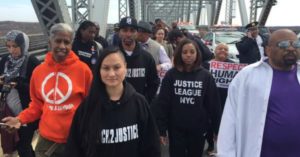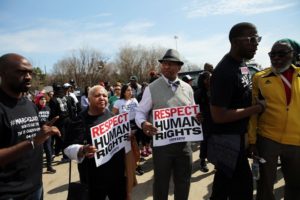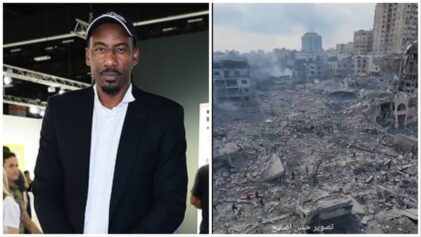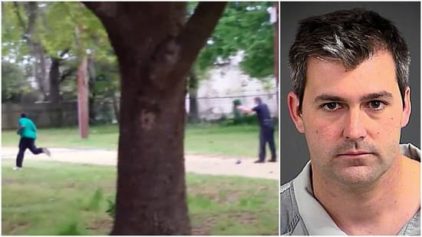
A group of roughly 100 protesters started the march on Monday morning in the very borough where officer Daniel Pantaleo put Staten Island father Eric Garner in a fatal chokehold.
Many of the protesters had Garner’s famous last words printed across their shirts—“I can’t breathe.” The phrase he uttered 11 times while officers failed to render any aid and refused to loosen their deadly grasp around his neck.
Others in the crowd carried signs that read “Black Lives Matter.”
The 250-mile march has been deemed the “March 2 Justice” and was organized by a group called the Justice League NYC.
For those marching for more than a week to bring national attention to their cause, they wanted to stress the importance of going beyond social media to voice concerns and frustrations with racism in America.
“[I’m] tired of creating hashtags,” said one 19-year-old protester from The New School to the Huffington Post. “I’m tired of seeing all these people that look like me on the news, so that’s why I’m marching.”
She added that she was frequently stopped and frisked growing up in New York because police assumed she was a prostitute.
“I was 16 years old going to church with a peacoat on,” the teenage activist added.
Reports about exactly how long the march will be vary but all indicate that it will take about eight or nine days for the group to reach their final destination in Washington D.C.
The message they hope to share through the march is clear.
“We want to shed light on the injustices that are happening in different communities, particularly around police brutality, and the mass incarceration of our black and brown communities,” Carmen Perez, the march’s director, told the Huffington Post.
So far authorities have been very accommodating to the group as the New York Police Department and Port Authority blocked off the Outerbridge Crossing for an hour on Monday to provide easy access for the protesters as they made their way across the Hudson and into New Jersey.
The group of activists making the entire journey stands at around 100 but other groups of protesters are expected to join the Justice League on different, shorter legs of the journey.
According to New York city council member Jumaane Williams, the growing size of this march is caused by the wave of troubling videos that capture just how serious the problem of police brutality really is.
“Each video’s getting worse,” Williams told the Huffington Post. “Without the camera, justice would’ve definitely been denied [in Walter Scott’s death].”
That tragedy is adding yet another spark to the already burning fire under activists who want to see the unnecessary deaths of unarmed Black men come to an end.
Those cringe-worthy videos, Williams adds, is causing once passive witnesses to such violence to get off the “sidelines” and get more involved in national pushes for more change.
Other politicians that joined the protesters included city councilwoman Debi Rose, former New York City Comptroller John Liu and state Senator Gustavo Rivera.
In addition to those who will be marching, there will also be those who are supporting as the group makes their way through their own neighborhoods.

Unlike many other protests that have sparked in the wake of the recent string of deaths of unarmed Black men at the hands of police officers, the Justice League wanted to make their immediate demands clear and apparent.
“We need body cams,” Williams added. “We also need structural change. While it’s about police reform, we also need to help create change within the communities.”
The group hopes to spark that change through support for three federal bills.
The Juvenile Justice and Delinquency Prevention Act would “create funding to improve conditions in local and state juvenile justice programs,” the Huffington Post reported.
The End Racial Profiling Act would hope to prohibit police from profiling anyone based on their race, ethnicity or national origin, but it isn’t clear how such a law would be enforced.
Lastly, the Militarization Bill would limit police departments’ access to the type of military equipment that was at the center of controversy when protests took over the city of Ferguson, Missouri, following the death of Michael Brown.
Protesters are expected to reach their final destination by April 21 where they will have a large rally with live performances before meeting with Congress for “informational sessions.”


